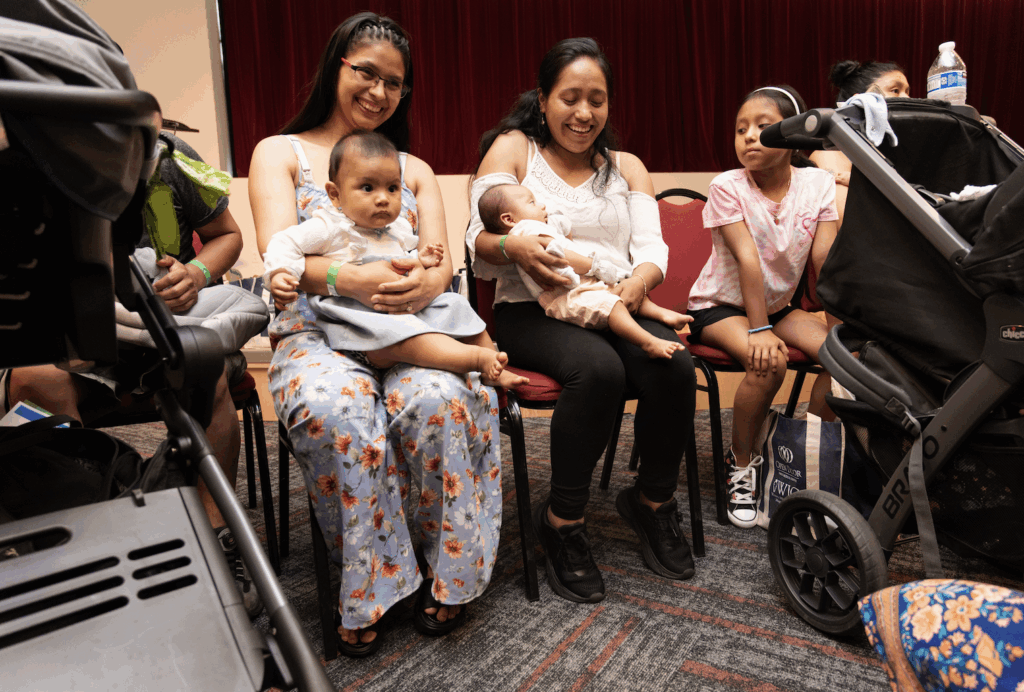It’s normal for it to hurt.
You need to restrict your diet.
If you’re not producing milk early on, you’ll never produce it.
Formula is just as good as breast milk.
These are just some of the myths about breastfeeding that Open Door Care Network and its WIC (Women, Infants, Children) team worked to dispel last month during a week-long series of workshops held at its sites throughout the county to prioritize breastfeeding and create sustainable support systems during National Breastfeeding Month.
“Research shows that women who are more supported and have a strong network are more likely to succeed in meeting their breastfeeding goals,” said Gina DeVito, WIC Program Director at Open Door. “We strive to provide every component of what’s needed to be successful.”
This can range from advice from certified lactation counselors and nutritionists to free breast pumps.
Educating women about the importance of breastfeeding to both mother and baby has long been at the core of WIC’s work and what its staff disseminated to participants in the patient workshops. Studies have long shown that human milk helps infants achieve optimal growth and development. It reduces the likelihood of diabetes, obesity and such illnesses and conditions as ear infections, diarrhea, lower respiratory infections, allergies and SIDS. Less known is how it benefits the mother as well – reducing the incidence of osteoporosis and hip fractures and helping to lose excess pregnancy weight more quickly. Recent studies have also found that breastfeeding reduces the risk of hormone receptor negative tumors, a very aggressive form of breast cancer, by up to 20 percent, and that mothers who breastfeed cut their risk of developing type 2 diabetes by almost 60 percent (among those who breastfeed for 10 or more months).
“We make a strong effort to be as culturally competent as possible and meet people where they are to address their individual needs,” said DeVito. “Since we serve people from diverse backgrounds and situations, we personalize the educational support we provide. For example, while New York State law permits breastfeeding in public areas, women from some cultures may not be comfortable with that approach. We work with them on their specific situation—which might mean developing a pumping schedule that fits their work schedule.”
The response has been very positive. Marleny, a recent patient at WIC Open Door, credited Yuby, her breastfeeding consultant, for helping make the choice to breastfeed a rewarding one. “Yuby’s attention, patience and kind words made me feel supported through everything,” she said. “She has been an expert and a friend who guided me with affection and helped me feel stronger, more confident and better prepared to care for and love my children.”
Through ongoing education efforts, DeVito and other breastfeeding advocates are reaching more women and empowering them to make informed breastfeeding decisions. For example, the percentage of breastfeeding for newborns in the U.S. has increased from 60% in the early 1990s, to 77% in the mid-2000s, to 84% today. While the percentage of infants exclusively breastfed at six months is far lower, this has also increased – from 17.2% for children born in 2010 to 25.4% for children born in 2020, according to the CDC.
The American Academy of Pediatrics strongly recommends exclusive breastfeeding for the first six months of a baby’s life and then continuing breastfeeding alongside complimentary foods for at least the first year.
“It’s hard work and some new mothers persevere through significant challenges with breastfeeding,” said DeVito. “We love to acknowledge and respect these efforts. It’s such an honor to be part of that journey and to contribute to the healthy development of our newest additions to society.”
